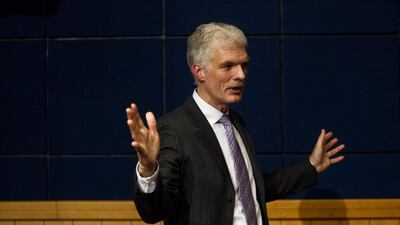ABU DHABI // The UAE has held on to its top ranking for the region in a survey of pupils’ proficiency, but experienced a drop in its global placings for two subjects.
Results from the Programme for International Student Assessment (Pisa) released on Tuesday also show that UAE pupils continue to fall below the Organisation for Economic Co-operation and Development average in the three subjects tested – science, reading and maths.
More than 500,000 pupils aged 15 from 35 OECD countries and 37 partner countries and economies, including 15,000 from UAE public and private schools, took part in the Pisa assessment, which is issued every three years.
The UAE’s National Agenda calls for it to rank among the top 20 in Pisa by 2021.
While the Emirates moved up one notch in mathematics, where it now stands in 47th place, it fell two places in science, from 44 to 46, and reading, where it dropped from 46th in 2012 to 48th place last year.
“While comparisons are always useful, I think it is important to use it more as a guide,” said Dr Natasha Ridge, executive director of the Sheikh Saud bin Saqr Al Qasimi Foundation for Policy Research in Ras Al Khaimah.
“What’s more helpful is disaggregating the results, looking within the country and seeing where are the areas we can really improve and which are the ones we should focus on, rather than looking outwards at where we rank against other countries.”
The UAE’s mean scores in each of the three subjects also decreased. It had a mean score of 437 points in science, which is an 11-point drop from the 448 it earned in 2012, and 56 points less than last year’s OECD average.
Other countries and economies whose mean score is comparable to the UAE in science include Bulgaria, Uruguay, Romania and Cyprus.
In maths, where the OECD average last year was 490, the UAE earned 427 – seven points under its performance in 2012. The UAE’s maths scores this round were similar to Chile and Turkey. With reading, UAE pupils last year earned a mean score of 434 – eight points less than 2012 and 51 points under the OECD average.
Other countries to score similar to the UAE in reading include Uruguay, Romania, Bulgaria, Turkey, Costa Rica, and Trinidad and Tobago.
Research has shown that a “big hindrance” for Arab pupils sitting for the Pisa is pupils’ ability to read at the speed required to answer the question in time, said Dr Ridge.
“That is a big barrier and that is I think one of the reasons why we consistently see low performance across the Arab world,” Dr Ridge said.
She added that the Al Qasimi Foundation was working to improve literacy in early-years programmes to address this issue.
Peter Adams, senior manager for Pisa, cautioned that with data from only 2012 and last year, “you cannot establish any trends” for the UAE.
Although Dubai private schools have taken part in Pisa since 2009, the UAE didn’t start to take part in the full assessment until 2012.
“Clearly the results will be disappointing for the Ministry of Education, but the more important consideration is to look behind the data to see what it is telling us,” said Mr Adams.
“The mean scores are obviously important but it is equally important to understand the underlying detail, because that is the real value of Pisa – the breadth and depth of the data.”
Pisa also assessed pupils’ levels of interest in science and their expectations of science-related careers. The survey also measures equity in education, rates of truancy and punctuality and other data.
Mr Adams said the next Pisa survey for 2018 will be important for the UAE because it may be too early to see the impact of ministry policies for improving pupil performance.
“Nonetheless, these results are likely to act as an incentive to continuing policy development and improvement where appropriate,” he said.
Jordan, Qatar and the UAE are the only non-OECD member participating Middle East countries.
Other Arab League countries to take part in Pisa include Algeria, Tunisia and Lebanon.
Andreas Schleicher, director of the OECD’s directorate of education and skills, said it is still “too early” to see the results of the UAE’s education reforms.
“The Pisa 2015 remain broadly similar to those from earlier assessments,” Mr Schleicher said of UAE’s scores. If the UAE is to improve its trajectory, “a relentless focus on teaching will be key”, he said.
“Teachers need to be empowered to lead this transformation, but that can only happen when they know what is expected of them – and get the support they need to teach effectively.”
Jamila Al Muhairi, Minister of State for Public Education, commended the UAE for achieving the highest mean scores in the region. Ms Al Muhairi said that the UAE was intent on achieving its Pisa objectives according to the UAE Vision 2021.
She said the Ministry of Education had developed a plan with the Abu Dhabi Education Council and the KHDA.
These include issuing reports that enable schools to analyse their Pisa results and a comprehensive training programme for schools to improve performance.
rpennington@thenational.ae

